Content Warning: This article discusses verbal abuse, sexual slavery, and rape as depicted on Game of Thrones.
After torturing myself with a rewatch of the sixth season of Game of Thrones, (hey it’s okay to hate watch!), I’ve been thinking a lot about the concept of ‘adaptation’. While I think we can all safely say that the show has moved so far off from its source material that ‘adaptation’ might not be the right word anymore, the process of adapting is still one of the greatest means of critiquing our media today. It gives us a grander view behind the curtain at all the cogs and machinery that go into the choices the creators make. On an original show, one doesn’t have the privilege of comparison. Filmmaker’s intention and the implications of the material can be more difficult to pin down without a source material to compare it to.
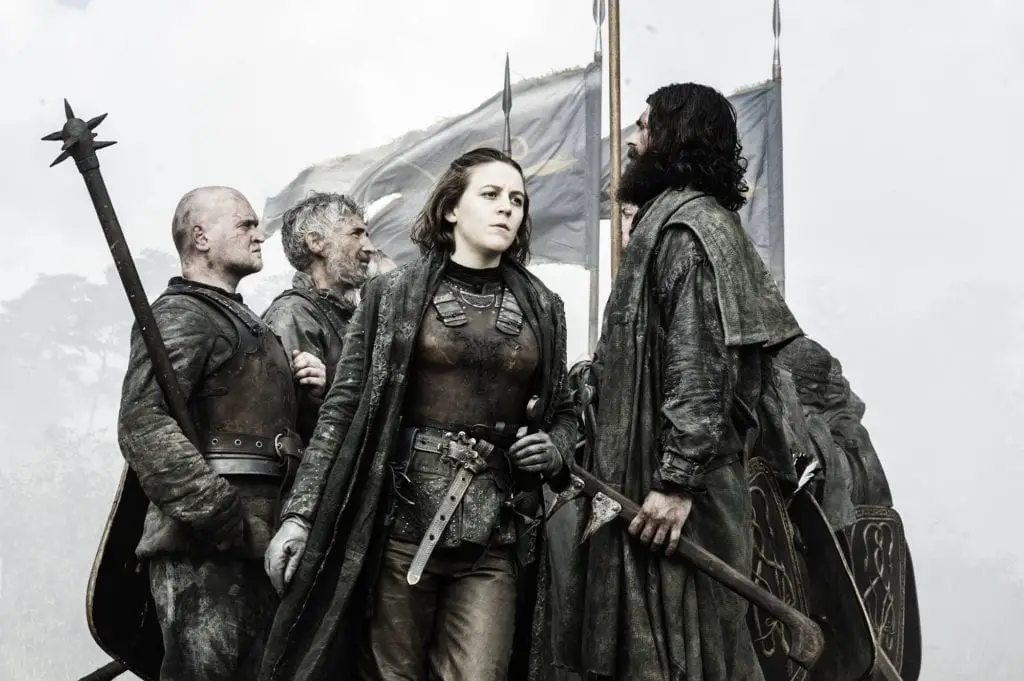 With Game of Thrones (“Thrones” from here on out) we have the ability to see when changes or omissions were made, what they entail, and thus what they mean. It’s the widest view into creator intention that could possibly exist, and it’s what makes Thrones criticism some of the strongest and most comprehensible criticisms of part of the art that doesn’t always resemble the finished product: the development.
With Game of Thrones (“Thrones” from here on out) we have the ability to see when changes or omissions were made, what they entail, and thus what they mean. It’s the widest view into creator intention that could possibly exist, and it’s what makes Thrones criticism some of the strongest and most comprehensible criticisms of part of the art that doesn’t always resemble the finished product: the development.
Creators, when adapting already written material, make a choice when they cut something or change something. Whether that choice means they didn’t think something was important, they didn’t think it was good enough, or they thought they had something better to service the story, it all leads back to initial developmental decisions that reflect on the creators.
David Benioff and D.B. Weiss have made all kinds of choices when adapting George R.R. Martin’s high fantasy series A Song of Ice and Fire. From the smallest changes that might have you asking as a book reader “Are they doing this just to spite me?” to glaring changes and omissions that say a lot more. One of the most personally frustrating parts of the show and its current place in pop culture is its depiction of sexuality, which is what I want to address today.
After Yara’s latest hitch as a swashbuckling rapist lesbian this past season and the treatment of Loras Tyrell, it’s clear that the sexuality spectrum has never been their strong suit. And let’s not forget Oberyn “I have to grab every ass in the room to prove to you I’m bisexual” Martell. However, in the books, there’s more fluidity. There’s more truth. That’s not to say that A Song of Ice and Fire is a beacon of light for LGBT+ representation in fantasy literature, but it’s leaps and bounds above its television adaptation. Suffice to say, the final result doesn’t paint a pretty picture of the movers behind the cogs.
For starters, the primary characters that the show has chosen to depict that are within the LGBT+ community are limited to the three mentioned above. None are depicted in well-rounded or positive ways in the adaptation. One was reduced to their sexuality and their sexuality alone, losing any and all characterization (Loras). Another become no more than the caricature of their sexuality that they were intentionally putting out as a front (Oberyn). The third was reduced to representing a letter in the acronym to check off a quota and, in doing so, became representative of the toxic masculinity that is so often forced upon the community by people who have never navigated it (Yara).
Loras Tyrell
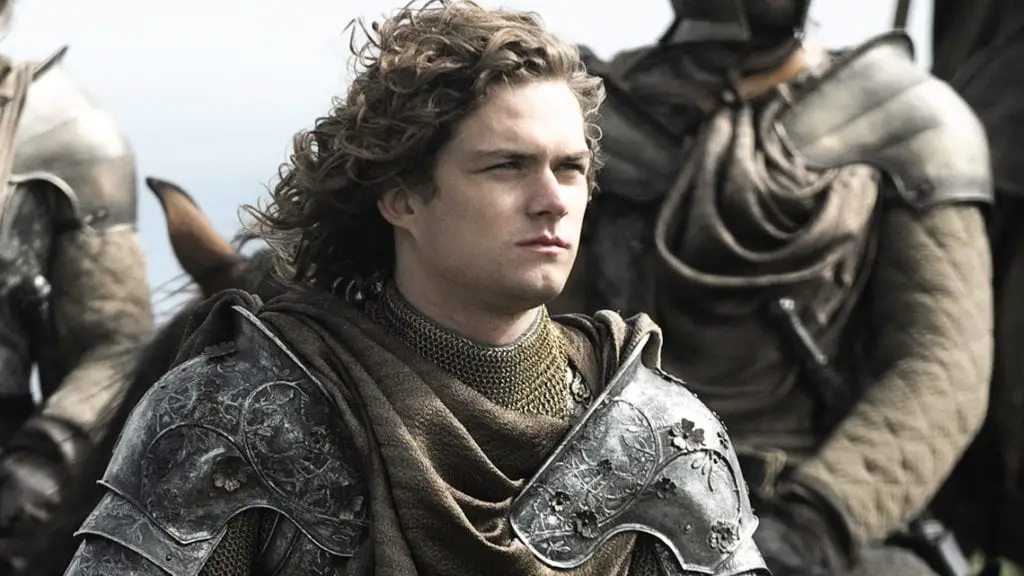
Sexuality is important and it’s a topic that Thrones, which claims to be a progressive force of fiction, continually fails to handle well. Loras’ character has been reduced to his sexuality ever since Renly’s death on the show. After being reduced to one part of his identity, he is then condemned for it, confesses to having sinned, and is mutilated as punishment all before he gets blown up with a mass of people at Kings Landing.
In the books, Loras is a knight. He’s proud, dashing, a great warrior, short-tempered, headstrong, and very much resembles a younger Jaime Lannister. They’re fascinating foils for each other in the books. Loras’ attempts to balance his journey as a knight and member of the Kingsguard with his love for Renly, a love that lasts more than a scene or two in the books in terms of grief, shows Jaime who he was and who he could be. Loras, Jaime laments, is stubborn and a little vain, but he is truthful. He is worthy of the title of knight and because of the heart, honor, and pride that guide him, he will most likely end up on the great pages of the White Book. He will thus secure his place in noble Westerosi history, a place that Jaime is trying to rewrite for himself.
“He is proud and reckless and full of piss, but he is not false. Not yet.” – A Storm of Swords, Jaime VIII
Moreover, Loras Tyrell’s love for Renly runs strong and true, so much so that he says, “When the sun has set, no candle can replace it.” In the show, they focus on his sexuality more than any other characteristic. He sleeps around after Renly’s death (there are jokes about him sleeping with every stable boy in King’s Landing), which perpetuates the stereotype that gay people are more promiscuous. In the books, Loras has this beautiful arc about coming to terms with Renly’s death that runs parallel to his virtuosity as the ideal picturesque vision of knighthood. All of that nuance is lost on the show.
Oberyn
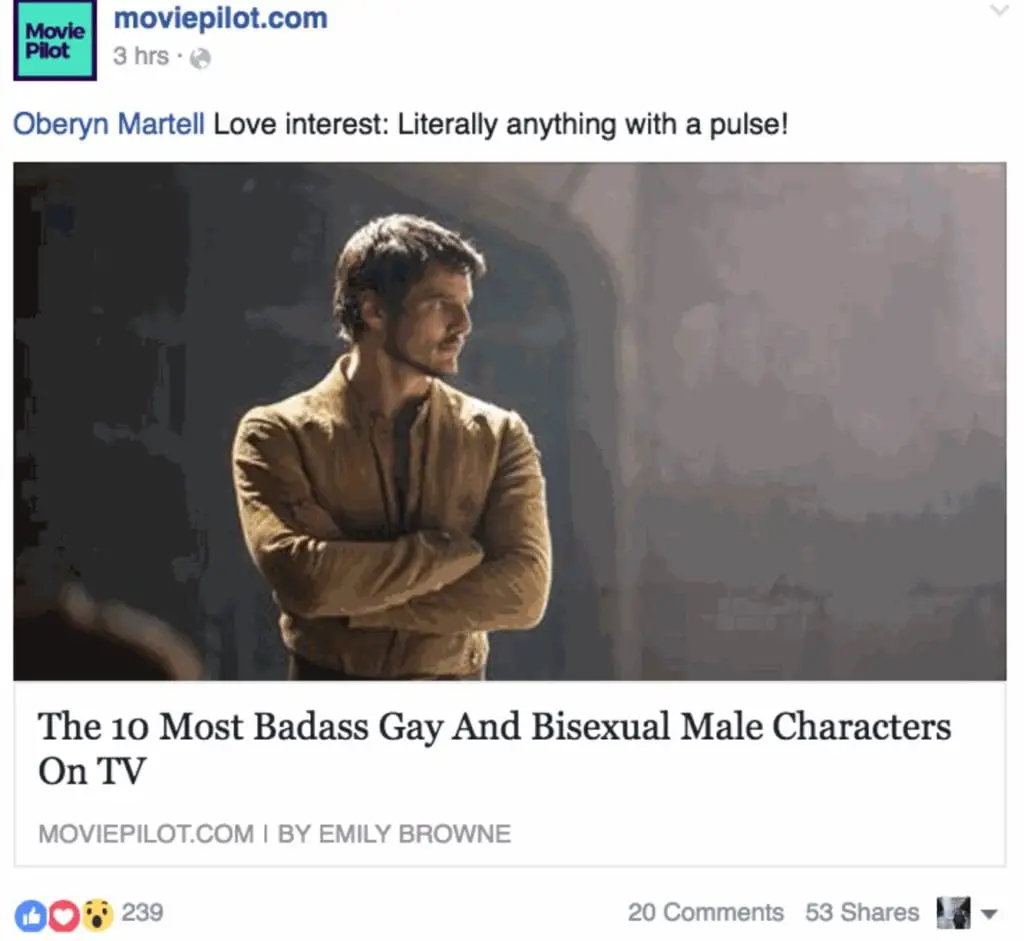
Oberyn’s sexuality on the show is essentially as heavy handed and offensive as Loras’. The writing of Oberyn evinces the horrible trope where bisexuals are hyper-sexualized. In order to prove to the audience that they are bisexual, writers feel the need to depict them in bed with both sexes repeatedly. It’s why Benioff and Weiss set practically all of Oberyn’s scenes in a brothel. Such damaging stereotypes about bisexuality, as well as the oversexualized POC imagery they are pushing, are all fronts Oberyn puts on for the people at Kings Landing to shock them. However, Benioff and Weiss took this act seriously (probably because they didn’t end up adapting the POV character that breaks the racist caricatures of Dorne) and in doing so, made his sexuality the punchline, just as Loras’ was.
In the books, when Oberyn comes to Kings Landing, he puts on the facade of being the racist Dornish stereotype everyone thinks him to be. He flaunts his sexuality and progressiveness in front of them all because he wants to make them uncomfortable and knows that it will. However, the stereotype Oberyn perpetuated to disquiet everyone with his presence was quickly broken down by the narrative. The Dornish no longer seemed a stereotype once we heard his deeper conversations with Tyrion. Even less so once we got Dornish perspectives in the story.
Yara
Yara, however, is probably the most offensive of all and so incredibly frustrating. In a perfect world, the possibility of a character that I am emboldened by as much as I am by her book counterpart being apart of the community I identify with would be a jump for joy moment. Instead, it was a disastrous series of events as the writers took Yara’s book counterpart and made her revolting rather than empowering.
My immediate emotional reaction to the Volantis brothel scene in Season 6 was revulsion. I sat there dumbstruck at how they could have made this scene even worse than I could have possibly imagined it after the release of the trailer. I could not understand how people online were shouting happily about the fact that Yara was a lesbian and how great of a piece of representation what they just saw on their screen was. It took me a moment, because of this disparity of opinions, to come to terms with the fact that I wasn’t exaggerating. I realized that people are so starved for any form of representation on screen that validates their identity that even the most disgusting, problematic portrayal seems like a victory.
Moreover, the primary dialogue around the show seems afraid to actually critique its flaws, so I questioned whether or not I was making something bigger than it actually was. I wondered if my read on the situation was plagued by bias and assumption that the creators and writers meant something more sinister than they actually did. However, once I watched the “Inside the Episode” and deconstructed the choices they made, it was clear that the implications didn’t happen by accident.
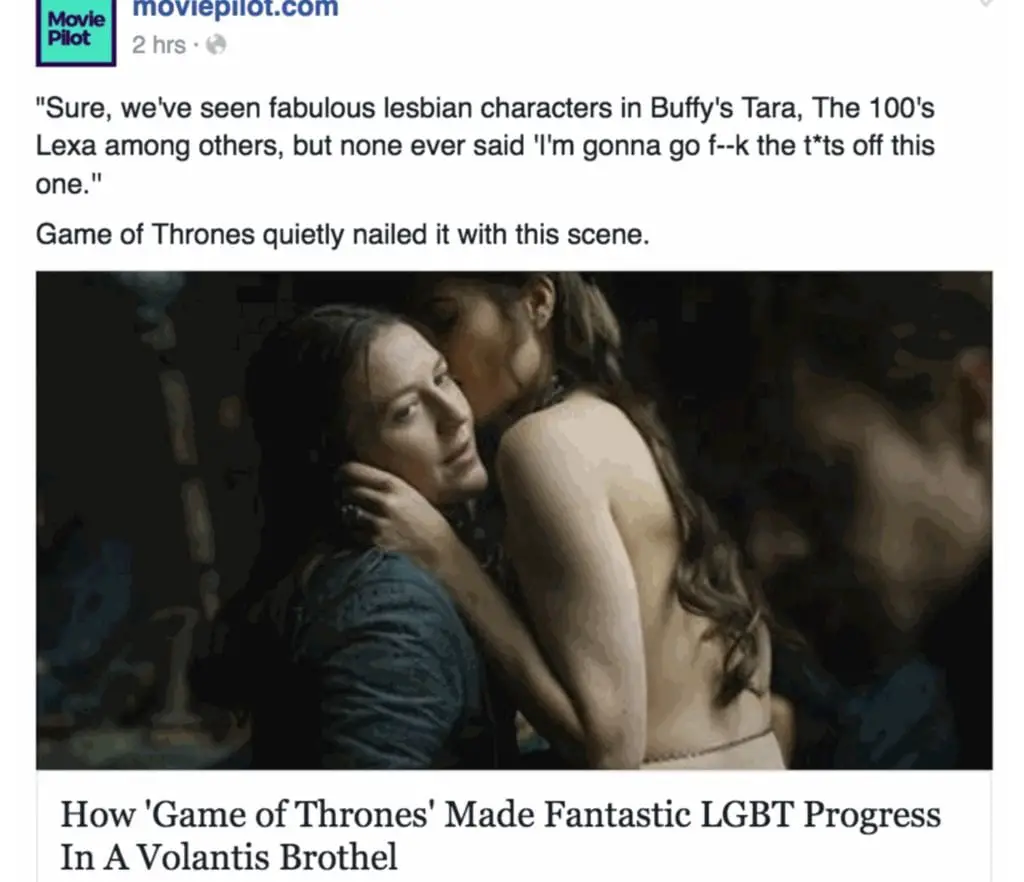
One of the biggest problems I have with the show in general is framing, which brings me to the age old battle of depiction versus endorsement. You’re allowed to depict something horrible, as long as the lens through which you tell your story doesn’t endorse it. Context must clearly communicate the act as horrible. With Yara, while it would still be disgusting character assassination and bad representation, if they at least framed her actions as negative, I would have been more comfortable with watching it play out on my screen. If Yara’s verbal abuse of an already abused victim and rape of a sex slave was looked at through a lens indicating that what she is doing isn’t right and highlighting her wrongdoings, then it wouldn’t be as problematic. Instead, her actions were framed as positive.
This Yara is saturated with toxic masculinity. The reaction Yara has to seeing her brother again this season has been incredibly jarring, disturbing, and virulent. Her relationship with Theon was previously established on the show as one of love and care, so much so that she was willing to shake all responsibilities and the will of Balon to attempt a rescue.
“I’m going to pick the fastest ship in our fleet. I’m going to choose the fifty best killers on the Iron Islands. I’m going to sail up the Narrow Sea, all the way to the Weeping Water. I’m going to march on the Dreadfort. I’m going to find my little brother. And I’m going to bring him home.”– Yara, 3.10 “Mhysa”
This doesn’t sound like a person who would subsequently tell her brother, when he is in the most need of her support and care, that he should kill himself or forget his trauma. There’s uneven characterization in general. Where previously Yara combated the Ironborn ways of life, commenting on the futility of reaving, she tries to earn support at the Kingsmoot by pledging to command the biggest fleet the Iron Islands have ever seen. While an arc of wanting to change a damaged and futile system emerges early on, it begins to quickly disappear.
It’s lazy storytelling in general, crafted to fit the needs of the plot rather than character driven journeys. Especially when compared to the takeaway for Asha’s (Yara’s book counterpart) reaction to seeing her brother again for the first time, albeit under different circumstances, which is much stronger and sweeter. In a show and story that so rarely gives us beautiful and supportive relationships between siblings, where we get either the toxic incestuous relationship between Jaime and Cersei or even a seed of discourse stirring between Jon and Sansa after reuniting, showing this, especially in a people like the Ironborn, would have been beautifully meaningful. In a sample chapter from The Winds of Winter, the unreleased next installment of George R.R. Martin’s A Song of Ice and Fire series, Theon describes Asha’s reaction to seeing her brother and hearing his story.
“You have to know your name,” he’d told his sister. “You… you told me you were Esgred, but that was a lie. Your name is Asha.”
“It is,” his sister had said, so softly that he was afraid that she might cry.
–The Winds of Winter, Theon I sample chapter
Asha turns her initial disgust at a creature she believed to be pathetic to endearing sincerity, care, and sadness for a brother she thought lost and a brother who had been broken apart.
Not only is Yara verbally abusive to Theon, but all of her interactions with the sex slaves tell a story of sexual abuse. In Volantis, slaves are marked by tattoos. Varys even explains this last year in his chat with Tyrion.
Tyrion: “Slaves?”
Varys: “Yes. The Volantine masters are very organized. Flies for dung shovelers. Hammers for builders. Tears for whores, lest they forget.”
–Varys, 5.03 “High Sparrow”
We are even told the specific tattoo that makes a sex slave: a tear drop. The woman Yara kisses has been marked with said tattoo and thus, is a sex slave. It’s information being directly fed to us on the screen, and it’s undeniable.

Yet, the fact that this “glorious” bit of representation was a depiction of rape, not sexual agency, is completely missing from the dialogue regarding this scene. The sex slave has no agency. She is someone’s property who uses her as a good or service like an object, and Yara continues to treat her that way. She’s not free to make the decision to kiss Yara. She’s not free to act on her own accord. If someone is not psychically free, no matter what face they are putting on, they have no agency to make choices that dictate their life. Kissing a sex slave in a brothel isn’t a scene of proud sexuality and consent. If one person can’t properly give consent, it’s rape.
The worst part is, either the writers neglected to realize it’s rape, which they’ve done in the past, or they forgot what they had already written. Further along in the scene with Tyrion and Varys in Volantis, they show up at a brothel where Tyrion proceeds to turn down sex with a sex slave after charming her with his ‘wits’, because he’s too good for that narrative. God forbid we paint Tyrion in a negative light because on the show, he’s turned into a “Mary sue”-eqsue character who can do no wrong. He can’t bring himself to have sex with a slave because he knows she has no agency, and he’s jut too good of a guy to ever do that.
Either the writers forgot or expected their audience to forget the tattoo that marks the sex slaves, and so when this scene happened, they expected raves and cheers of support for their great instance of ‘representation.’ They chose not to frame Yara’s interaction with the sex slave as clear rape within the narrative when in the past season, Tyrion’s instance of refusing to partake in sex with one furthered his endless Nice Guy arc and continued to confirm him as a hero who can do no wrong. There are worrying implications from both a writer’s standpoint and a storytelling standpoint. Virtually the only instance of lesbian representation on this show is one of rape. At the same time, a straight hero was previously placed in the same situation with a more complicated underlying narrative wherein he chose to take the ‘moral’ high ground. This is more than just a commentary on the problematic Ironborn way of life.
This scene was one of the only scenes of sexual nature between two women, other than the brothel scenes with Littlefinger where they are all for the male gaze, and yet this felt just as gross. This one and only scene, a scene that had many people cheering, was a moment of rape and toxic masculinity internalized tenfold. I don’t think you can call it good representation when the lesbian character we’re supposed to identify with and support in the narrative is a rapist and a sexist who believes the women she is raping are things. Even without directly naming the slavery aspect in this episode, she calls the girl that she is going to “fuck the tits off of” “this one,” as if the slaves were an object. She’s not ‘navigating’ this patriarchal society. She’s perpetuating it here with rape and looking at sex slaves as objects, not people.
Within the structure and narrative of the Ironborn culture of the books, I could see Euron, Balon, the book character and other Greyjoy uncle Victorian, and even the past-Theon saying this, but Asha (Yara’s book counterpart)? Asha who was born into this lifestyle and culture but as a woman who had no interest in being a Salt Wife. Asha who had to grow up combatting the inherent sexism within her society in order to find a way to rule. One of the best examples of her attitude towards the Westerosi patriarchy and toxic masculinity in general comes from her POV chapter in A Dance with Dragons.
“Cunt again? It was odd how men like Suggs used that word to demean women when it was the only part of a woman they valued.”–A Dance with Dragons, The Sacrifice
Asha has been on the receiving end of a million “cunts” and a victim of sexism all her life. Living and growing up on the Iron Islands only multiplied it. A woman in her position, who’s had to navigate the Ironborn her whole life and earn their respect, knows how it feels to be mistreated for because of her gender. She had to work hard within that structure to prove herself as a a good ruler in order to get the type of support she wants, especially at the Kingsmoot, but this applies to Balon’s support as well. However, if Theon hadn’t been a victim of war and been taken by Ned to be his ward at Winterfell, I don’t doubt for one second that even one of her greatest supporters (Balon) wouldn’t have given her a second glance or anywhere near the amount of attention and respect that he did.
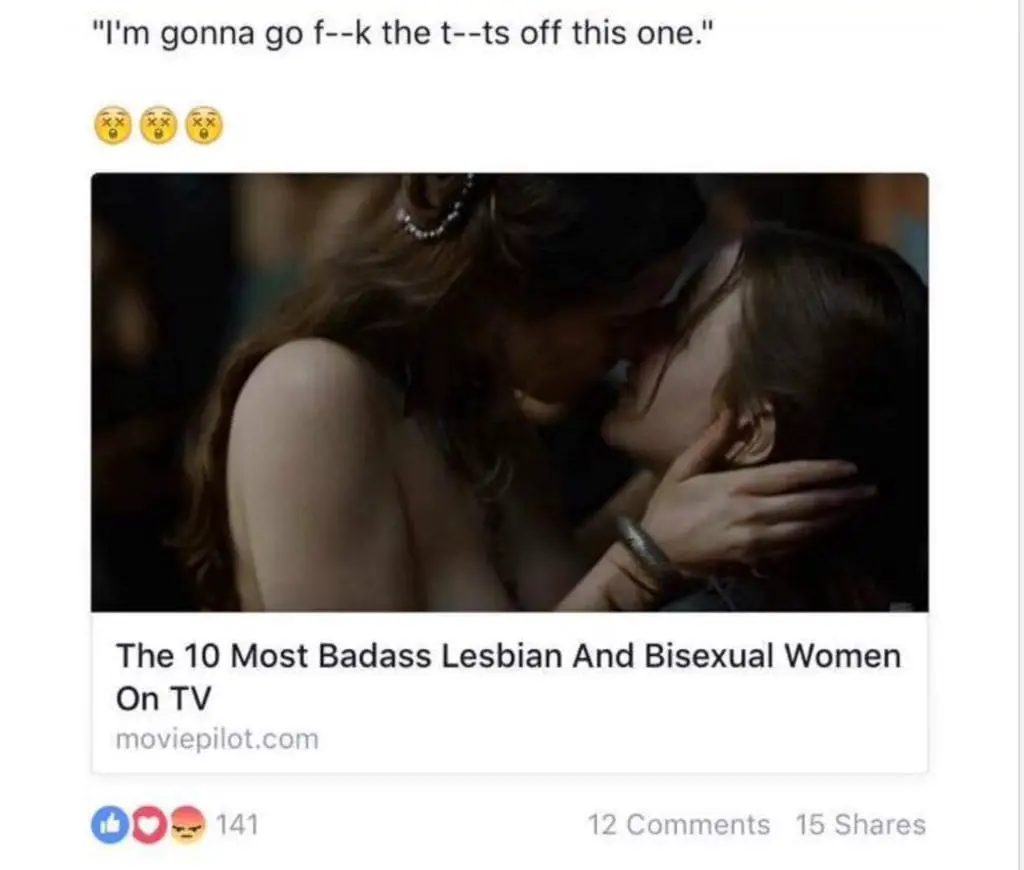
All of her “masculine” traits that she pushes in the books were products of fighting against the sexism of the Ironborn culture. She is forced to navigate it because she lives in it, but she also combats it. How else would she have been accepted and respected as the warrior and leader she had come to be in the Iron Islands? By taking Theon’s place and learning how to fight her battles against the system from within, she became the heir Balon had lost.
Instead of that narrative, where she’s a tough Ironborn but a victim of the system and culture that she must navigate and overcome, we get internalized misogyny multiplied and shot back uncritically. In the books, she is a captive of Stannis’ army, and one of her guards is Alysane Mormont. A relationship that begins as captive and captor turns into respect and earnest warmth. That journey of mutual female respect is documented through the names Asha uses to refer to Alysane. What starts out as “the She-Bear” becomes “Alysane” and eventually, “Aly.” This is not a woman who treats other women like things.
Yara is an abuser. From rape to verbally assaulting her abused brother Theon, she has become a grossly toxically masculine person, not just navigating but embodying all the bullshit she’s had to combat to command Ironborn ships and be respected as Balon’s heir. Why are we even supposed to favor and support her over her uncle Euron, who is just as toxically masculine and cruel? They think, behave, and internalize their culture to the same extent, and are virtually the same. Minus Euron’s kinslaying, which no one has an issue with anyway. It’s no wonder the Kingsmoot picked Euron after he discussed the size of his penis, since Yara’s mindset is consistent with that same dude-bro patriarchy brain.
I also have to mention that in the books she is straight, and vehemently so. Usually, I would be one of the first people jumping for joy at the notion of one of my favorite characters representing something so rarely represented on screen. However, I can’t help but think that the decision to make Yara, a less stereotypically feminine female character, gay reflects a stereotype that the show runners and creative team perpetuate in their heads. It’s at the very least consistent with Alex Graves calling Brienne, also a non-conventionally feminine character, a lesbian. It is also worrying because in the books, her heterosexuality is one of the few instances depicting female sexual agency and choice of partner for a woman in this society, contrasting all of the arranged marriages we see. In the show, Yara’s sexuality is changed to represent a different minority, but is showcased in such a way that she is the only one in the act with any agency.
And That’s It
This is all the representation we get? This is what websites are cheering about? This is what the show is getting applauded over? Thrones has never been good with diverse representation, especially not representation of sexuality. While it’s not easy to maintain every secondary and tertiary characters’ arcs, they should still be fleshed out and fully rounded people. Loras was gay. That was the only characterization they gave him and the only thing his scenes ever indicated or told us. They continued this pattern with Oberyn Martell and Ellaria Sand, both of whom are bisexual. Most of their scenes took place in a brothel. The show fell into the trap of equating bisexuality with hyper-sexuality, an offensive, harmful, and ridiculous stereotype. Yeah, they both could enjoy sex and engage in it often, but that’s not all they do. From the show, we wouldn’t have guess that. It’s one of the biggest issues they fell for when adapting Dorne in general.
A desired subversion of these stereotypes never comes on the show, and these people are all reduced to their sexuality. Thus, while another sexuality might have technically been “represented” on our screen, it was more harmful than honest and positive. Yara’s character and the situation in the brothel is downright damaging, yet it’s cheered in the critical and cultural dialogue. Furthermore, it’s supported in the narrative, as Weiss and Benioff don’t seem to see the toxicity in their relationship or the blatant abuse here as being harmful. After all, abusing an abuse victim is just “tough love” (according to their “Inside the Episode”). Rape is apparently a badass and brave form of lesbian representation, too. The writing refuses to frame Yara’s interaction with the sex slave as clearly negative and wrong, yet, they had no issue doing so with Tyrion. They reduced lesbianism down to a gratuitous representation of her sexuality, while also characterizing her as the toxically masculine face of sexism that stains Ironborn culture.
From the mess of what they chose to adapt to the nuance and character exploration of what they didn’t (i.e. Jon Connington or Taena Merrywhether) it’s clear that they made a choice. A choice that, in the end, resulted in both a stunted and harmful depiction of what little representation the LGBT+ community can claim in this blockbuster of a show. Choices matter, and as we move toward the end of the show, a show that some people are lauding as a beacon of feminism and representation in fantasy, it becomes clearer that what Benioff and Weiss are actually interested in adapting is not a genuine attempts to represent diverse communities as people. They seem far more interested in representation points, even if they perpetuate problematic stereotypes and falsities, in order to create the spectacle without heart that Thrones has become.

